Ipswich serial murders
| Steve Wright | |
|---|---|
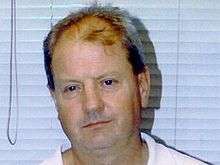 Steve Wright was convicted of five murders on 22 February 2008 | |
| Born |
Steven Gerald James Wright 24 April 1958 Erpingham, Norfolk, UK |
| Other names | The Suffolk Strangler |
| Criminal penalty | Life imprisonment - with recommendation of a whole life tariff |
| Conviction(s) | Five counts of murder |
| Killings | |
| Victims | 5 |
Span of killings | 30 October–10 December 2006 |
| Country | England |
Date apprehended | 19 December 2006 |
The Ipswich serial murders took place between 30 October and 10 December 2006, during which time the bodies of five murdered women were discovered at different locations near Ipswich, Suffolk, England. All of the victims were women who had worked as prostitutes in the Ipswich area. Their bodies were discovered naked, but there were no signs of sexual assault. Two of the victims, Anneli Alderton and Paula Clennell, were confirmed to have been killed by asphyxiation. A cause of death for the other victims, Gemma Adams, Tania Nicol and Annette Nicholls, was not established.
Suffolk Police linked the killings and launched a murder investigation codenamed Operation Sumac. Due to the size of the investigation police officers were drafted from several other police forces. Two arrests were made in connection with the murders. The first suspect, who was never officially named by police, was released without charge. Forklift truck driver Steven Gerald James Wright, then aged 48, was arrested on suspicion of murder on 19 December 2006 and charged with the murders of all five women on 21 December.[1]
Wright was remanded in custody and his trial began on 14 January 2008 at Ipswich Crown Court. Wright pleaded not guilty to the charges, although he admitted having sex with all five victims and that he had been patronising prostitutes since the 1980s. DNA and fibre evidence was presented to the court that linked Wright to the victims. He was found guilty of all five murders on 21 February 2008 and was sentenced the following day to life imprisonment with a recommendation that he should never be released from prison.[2]
The murders received a large amount of media attention, both nationally and internationally. The press often compared the murders to those committed by the Yorkshire Ripper, Peter Sutcliffe, who murdered 13 women and attacked seven others (mostly prostitutes) between 1975 and 1981. There was some concern that the level of media coverage at the time could jeopardise a trial. The murders also sparked debates in the media over the laws surrounding prostitution.
Police investigation
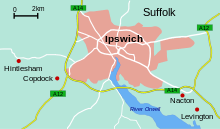
The body of a young woman was discovered in the water of Belstead Brook at Thorpe's Hill, near Hintlesham, by a member of the public on 2 December 2006.[3] The body, later identified as 25-year-old Gemma Adams, had not been sexually assaulted.[3][4] Six days later, on 8 December, the body of 19-year-old Tania Nicol, a friend of Adams who had been missing since 30 October, was discovered in water at Copdock Mill just outside Ipswich.[5] There was no evidence of sexual assault.[6] On 10 December, a third victim, found by a member of the public in an area of woodland by the A14 road near Nacton, was later identified as 24-year-old Anneli Alderton. According to a police statement, she had been asphyxiated and was about three months pregnant when she died.[7][8]
In a press conference police warned all women to stay away from the red light district of Ipswich.[9] On 12 December, Suffolk police announced that the bodies of two more women had been found.[10] On 14 December, the police confirmed one of the bodies as 24-year-old Paula Clennell.[5] Clennell had disappeared on 10 December and was last seen in Ipswich.[11] According to Suffolk Police, Clennell died from "compression of the throat".[12] On 15 December, the police confirmed that the other body was that of 29-year-old Annette Nicholls, who disappeared on 5 December.[13] The bodies of Clennell and Nicholls were found in Nacton near the Levington turn-off of the A1156, close to where Alderton was found. A member of the public had seen Clennell's body twenty feet (six metres) from the main road and a police helicopter dispatched to the scene discovered the second body of Nicholls nearby.[5]
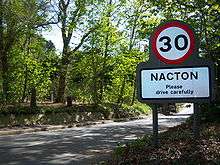
Suffolk police linked the killings and launched a murder investigation,[14] codenamed Operation Sumac.[15] Chief Constable Alastair McWhirter acknowledged that Suffolk Constabulary would be reliant on external assistance due to the magnitude of the investigation. A senior investigator with the Metropolitan Police, Commander Dave Johnston, was reported to have been drafted into the murder inquiry team from Scotland Yard in London in an advisory capacity.[16] The day-to-day investigation was conducted by Detective Chief Superintendent Stewart Gull.[17]
During press conferences on 13 and 14 December, DCS Gull revealed that police believed the locations where the five bodies were found to have been 'deposition sites', not murder scenes, indicating that the victims were all killed elsewhere and transported to the locations where they were later found; no comment was made on where the women may have been murdered.[18] DCS Gull also revealed that some items of women's clothing and accessories, including a handbag and jacket, had been recovered and were being forensically tested to establish whether they belonged to any of the murdered women.[5][19]
During the course of the press briefings, DCS Gull stated that over 300 police officers were involved in the investigation, and some 400-450 calls were being received daily by detectives.[20]
On 15 December, Suffolk Constabulary's website revealed that a total of 7,300 telephone calls had been made to police regarding the investigation, and that over 300 police staff and specialists were working on the cases,[20] with support from at least 25 other police forces.[21][22] As of 18 December, the number of officers involved in the investigation had increased to 650 including 350 officers from 40 other police forces who had assisted in the inquiry.[20] The number of calls received regarding the case had also increased to around 10,000.[23]
Victims
Tania Nicol
Tania Nicol, aged 19, from Ipswich, the first of the victims to be reported missing, disappeared on 30 October and was reported missing by her mother 48 hours later.[24] Her body was discovered on 8 December near Copdock Mill in a river by police divers;[25] there was no evidence of sexual assault and a post mortem could not establish a definite cause of death.[24] Nicol attended Chantry High School but had left home at 16 to live in a hostel, where she began to use heroin.[24] Nicol, the youngest of the five victims, worked as a prostitute to fund her addiction to heroin and cocaine.[26] She had originally worked in massage parlours, using the alias of Chantelle in one,[27] but was asked to leave on suspicion that she was using drugs.[25] Her mother was unaware she was a prostitute, and thought she had been working in a bar or a hairdressers.[24]
Gemma Adams
Gemma Rose Adams[28] aged 25, born in Kesgrave, last seen outside a BMW dealership on West End Road in Ipswich, where she had been living, disappeared on 15 November at about 01.15 (UTC).[29][30] She was reported missing the same day by her partner, with whom she had been for ten years.[3][30] Her body was found on 2 December, in a river at Hintlesham; she was the first of the victims to be found. Adams was found naked, in a brook, but had not been sexually assaulted.[4] Adams had been a popular child; she came from a middle-class family and had a love of animals. As a teenager she started taking hard drugs, becoming addicted to heroin.[26] She had been working as a prostitute to cover the cost of her drug addiction, which had already led to her being dismissed from her job with an insurance firm.[26][31] Her partner was at the time also a heroin user, and was aware she was working as a prostitute, although her family were not.[3]
Anneli Alderton
Anneli Sarah Alderton,[28] aged 24, a mother of one who was also in the early stages of pregnancy,[8] had been living in Colchester, Essex.[24] Alderton disappeared on 3 December and was last seen on the 17.53 train from Harwich to Manningtree.[32] Alderton got off the train at Manningtree at 18.15 before going on to Ipswich on another train, arriving at 18.43. Alderton's body was found on 10 December near Nacton, in woodland in front of Amberfield School. Alderton had been asphyxiated and was found naked, and was posed in the cruciform position.[24] Her pregnancy was also revealed by the autopsy and her family were first informed of it by police officers.[33] Anneli moved to Cyprus with her mother in 1992 after her parents separated, and they returned to Ipswich in 1997.[34] Alderton attended Copleston High School and gained good grades in her exams.[35] Alderton had been addicted to drugs since age 16, shortly after her father's death from lung cancer in 1998.[26]
Annette Nicholls
Annette Nicholls, aged 29, a mother of one from Ipswich, was initially thought to have gone missing on 4 December, but at the trial it was revealed she was last seen in Ipswich town centre on 8 December.[24] Her family reported her missing after they grew concerned at the news of the other murders.[24] Nicholls' body was found on 12 December near Levington, naked but not sexually assaulted, and also posed in the cruciform position; a definite cause of death could not be established, but her breathing had been hampered.[24] Nicholls, the oldest victim, had been a drug addict since the early 2000s, shortly after completing a beautician's course at Suffolk College.[36] Soon afterwards, she had started working as a prostitute to fund her addiction.[26] After moving to a housing association home from her council house, Nicholls asked her mother to look after her son.[36] She was thought to be staying with a man in Ipswich at the time of her death.[36]
Paula Clennell
Paula Lucille Clennell,[28] aged 24, born in Northumberland and living in Ipswich, disappeared on 10 December in Ipswich at approximately 00.20.[24] Clennell's body was found on 12 December near Levington on the same day as Nicholls'.[5] Clennell was found naked but not sexually assaulted and a post mortem reported that she had been killed by a compression of her throat.[12] Prior to her death, Clennell commented on the then recent murders in an interview with Anglia News, stating that despite them making her "a bit wary about getting into cars" she continued to work because "I need the money."[37] Clennell moved to East Anglia ten years before her death, following the break-up of her parents' marriage.[38] Clennell had three children with her partner; all had been taken into care and adopted due to her drug addiction.[38] Clennell herself had spent some of her childhood in a referral unit, and it was shortly after being placed there that she started taking drugs.[26]
Arrest of suspects
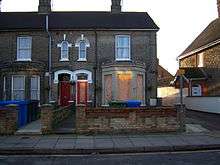
On 18 December 2006, Suffolk Constabulary reported that they had arrested a 37-year-old man on suspicion of murdering all five women.[1] The man was arrested at 07.20 at a house in Trimley St. Martin near Felixstowe, Suffolk.[39] The detention of the suspect was extended by magistrates by a further period of 24 hours, to the maximum of 96 hours allowed under English law.[40] On 19 December, at 05.00, police arrested a second suspect,[41] a 48-year-old, at a residence in Ipswich, on suspicion of committing murder.[41] The following day, 20 December, police were granted a 36-hour extension to question the second suspect in detention. On 21 December, a joint statement was issued by DCS Gull and Michael Crimp, senior prosecutor for the Crown Prosecution Service in Suffolk, announcing that the second suspect identified as Steve Wright had been charged with the murder of all five women.[42] Police said that the first suspect, who was not officially named,[1] was released on police bail.[42] Bail conditions were cancelled on 6 June 2007 for the first suspect, as no more inquiries concerning the case were planned involving this person.[43]
Court appearances
Wright appeared before magistrates in Ipswich on 22 December 2006 and was remanded in custody.[44] On 2 January 2007, Wright appeared before Ipswich Crown Court and was remanded in custody to appear before a court on 1 May.[45] At the 1 May appearance, Wright formally entered a plea of not guilty.[46] In July 2007, Wright appeared at a pre-trial hearing in London where it was announced the trial would begin 14 January 2008.[47]
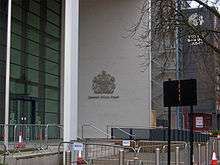
On 14 January 2008, Wright appeared at Ipswich Crown Court ahead of his trial, which began on 16 January, with the prosecution opening their case.[48] The court heard how the bodies of two of the victims, Anneli Alderton and Annette Nicholls, were deliberately posed in the cruciform position, with DNA evidence linking Steve Wright to three of the victims and fibre evidence also connecting him to the victims.[49] The defence argued that Wright was a frequenter of prostitutes, and he had "full sex" with all of the victims, barring Tania Nichols, whom he "picked up" with the intention of sexual relations, but apparently changed his mind and dropped her off back in the red light district of Ipswich.[50] This contradicted Wright's earlier statement when stopped by police in the district in the early hours of the morning, when he gave the police the impression he was unaware he was in the red light district and that he was driving around because he could not sleep.[51] Wright's rented flat is located in the red light area.[52]
On 21 January, jurors were taken to sites involved in the case. These included Wright's rented house, which they viewed only from the outside, and the areas where the victims were found.[53]
During the trial, the prosecutor, Peter Wright QC, suggested that Steve Wright may not have acted alone, as the remains of Anneli Alderton were found some distance from the road but with no evidence that her body had been dragged by one person.[54]
Jury
The jury in the trial was the second group chosen for the task, as a member of the original jury had a health issue which would have been prohibitive for the trial.[48] The jury consisted of nine men and three women.[55] All potential jurors had to complete a questionnaire, which asked if the candidates knew any of the victims, witnesses, or the suspect.[56] The judge told jurors that they should not do their own research or obtain information from the media on the case.[57] When it came time to sum up the evidence in the case, Mr. Justice Gross asked the jury to put aside their emotions stating:
“ The loss of these five young lives is clearly a tragedy. You are likely to have sympathy for the deceased and their families. Your sympathy... must not sway you...You may view with some distaste the lifestyles of those involved... whatever the drugs they took, whatever the work they did, no-one is entitled to do these women any harm, let alone kill them.[58] ”
Verdict
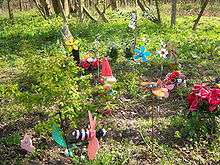
On 21 February 2008, after eight hours of deliberation, the jury returned a unanimous guilty verdict against Steve Wright on all five counts of murder.[59] A murder conviction carries an automatic term of life imprisonment but the judge could decide if Wright would be awarded parole at any point.[60] The prosecution QC argued that Wright should receive a whole life tariff and thus never be released from prison.[60] Subsequently, on 22 February 2008, Wright was sentenced to life imprisonment and Mr Justice Gross recommended that life should mean life, on the basis that the murders resulted from a "substantial degree of pre-meditation and planning".[61]
After the verdict, relatives of the victims thanked the police for their efforts to solve the crime, while some expressed their feelings that life imprisonment was not enough (even if Wright were to ultimately end his life behind bars), and that he should face the death penalty.[62] Craig Bradshaw, brother-in-law of Paula Clenell, stated:
| “ | Today, as this case has come to an end, we would like to say justice has been done but we're afraid that where five young lives have been cruelly ended the person responsible will be kept warm, nourished and protected. In no way has justice been done. These crimes deserve the ultimate punishment and that can only mean one thing. Where a daughter and the other victims were given no human rights by the monster, his will be guarded by the establishment at great cost to the taxpayers of this country and emotionally to the bereaved families.[61][62] | ” |
However, other family members seemed satisfied with the verdict. The father of Gemma Adams said:
“ I am very relieved and pleased for all of the families that this is now over and we can now start to get on with our lives.[62] ”
Prime minister Gordon Brown praised the "professionalism and dedication" of the police and prosecutors involved in the case, whilst using it as an example of what he believed to be the importance of the national DNA database.[63]
Steve Wright biography
Steve Gerald James Wright was born in the Norfolk village of Erpingham in April 1958.[64][65] Wright joined the Merchant Navy after leaving school. In 1978, he married and had a son soon afterwards; the couple later divorced.[66] In 1987 he married another woman; they separated in 1988, and later divorced.[67] He worked as a dock worker, a steward on the QE2, a lorry driver, a barman, and, just prior to his arrest, a fork-lift truck driver.[64] He became a father again with another lover in 1992.[64] Wright built up large debts largely through gambling,[65] and had recently been declared bankrupt.[64] Wright had twice tried to commit suicide, firstly by carbon monoxide poisoning and then, in 2000, by an overdose of pills.[64] Wright met his last girlfriend, Pamela Wright (the shared surname is a coincidence), in 2001 in Felixstowe, and they moved to the house in Ipswich together in 2004.[64] Wright had always admitted that he had used prostitutes, firstly whilst in the Merchant Navy,[65] and continuously throughout his life.[64]
Investigations into other crimes Wright might have committed continue, including the possibility of an involvement in the Suzy Lamplugh disappearance.[68] However Metropolitan Police have stated that this is not a strong line of enquiry.[69]
Media coverage
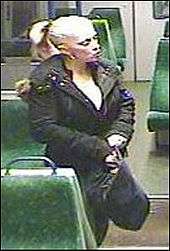
The murders have been likened to those by Peter Sutcliffe, the "Yorkshire Ripper" who was convicted of murdering 13 women (and wounding seven others), mainly those who worked as prostitutes, over a period of five years from 1975 to 1980 in northern England;[70] and to "Jack the Ripper", the infamous Victorian serial murderer who also targeted prostitutes.[71]
As with previous serial killers dating back to Jack the Ripper, many sections of the media have attempted to coin a name for the presumed murderer, using the "Suffolk Strangler",[72] and other terms to refer to the case.[73][74][75][76][77][78]
A reward was offered, first by local business Call Connection, who initially offered £25,000 and later raised it to £50,000.[79] Shortly after, the News of the World offered a £250,000 reward for leads to a direct arrest and conviction of the murderer/murderers, bringing the total reward on offer to £300,000.[80]
Concerns about the media coverage
On 21 December 2006, the then Attorney General Lord Goldsmith issued guidance to the media after concerns were raised by Suffolk Constabulary about the coverage and potential prejudice of a future trial. Lord Goldsmith urged the media to show restraint in what they reported about the two suspects being held, for fear of prejudicing any possible trial.[81] A senior prosecutor on the case, Michael Crimp, also expressed his concerns that media coverage could jeopardise the trial, stating:
“ Steven Wright stands accused of these offences and has a right to a fair trial before a jury. It is extremely important that there should be responsible media reporting which should not prejudice the due process of law.[81] ”
Coverage of related issues
The murders refocused press attention on a number of controversial issues in British politics.
The first is that of prostitution in the United Kingdom. The murders have highlighted the vulnerability of prostitutes and the lack of action taken by the government, whether to be more punitive in the hope of reducing the numbers of prostitutes on the streets, to move towards legalised brothels and other measures to improve the safety of the women, or to target the demand for prostitution through prosecution of the clients, as is done in Sweden.[82] The government has moved in the direction of tough "anti-prostitution" laws which target the clients. The government had at one point considered allowing "mini brothels",[83][84] but abandoned this plan after fears that such establishments would bring pimps and drug dealers into residential areas. Instead, the laws became tougher: the Policing and Crime Act 2009 made it illegal to pay for sex with a prostitute who has been "subjected to force" and this is a strict liability offense (clients can be prosecuted even if they did not know the prostitute was forced).[85][86]
The second is that of drug use and whether it should be legalised or decriminalised, provided on prescription to registered addicts, or penalised more harshly. High numbers (95% according to the Home Office)[87] of street prostitutes in the United Kingdom have a history of substance abuse, and prostitution is one means of funding addiction, known to have been used by all five of the victims.[88]
Appeals
On 19 March 2008, it was announced that Wright would be lodging an appeal against his five convictions for murder, as well as the trial judge's recommendation that his life sentence should mean life.[89] Amongst other things, Wright has claimed that the trial should not have been held in Ipswich, and that the evidence against him was not sufficient proof of his guilt, thus giving him grounds for an appeal.[90] Wright was reported to have written to the court of appeal "All five women were stripped naked of clothing/jewellery/phones/bags and no evidence was found in my house or car."[90] Wright has also applied to receive a new solicitor.[91]
The news of his planned appeal sparked outrage among those affected by his crimes, including Brian Adams, father of victim Gemma Adams, who remains convinced of Wright's guilt and urged him to instead "come clean and stop wasting everyone's time".[91] This first appeal was rejected in July 2008.[92]
On 15 July 2008, it was announced that Steve Wright had renewed his appeal against convictions, and it would be considered by three judges in an open court hearing, the Royal Courts of Justice said.[93] In February 2009, it was reported that Wright had dropped this bid to appeal against the convictions, though some of his family hoped to convince the Criminal Cases Review Commission (CCRC) to take the case on.[94]
On 3 December 2012, Wright announced that he would be launching a third appeal against his conviction.[95]
Dramatisations
The BBC Drama department commissioned a dramatisation of the murders and the investigation from screenwriter Stephen Butchard. The three-part production, entitled Five Daughters, began filming in November 2009, and was broadcast on BBC One from 25–27 April 2010. Only a few days after the BBC's announcement of the drama, Brian Clennell, the father of Paula Clennell, complained that it would portray the victims in "a bad light". Wright's brother David also complained that it would jeopardise any future retrial.[96] Sarah Lancashire and Ian Hart led the cast.[97]
A musical play, London Road, commissioned by the Royal National Theatre and written by Alecky Blythe and Adam Cork, is based on interviews with residents of the street in Ipswich where Steve Wright lived.[98] A film adaptation of the play was released in the UK in 2015.
The case was featured in an episode of the documentary series Real Crime.
See also
References
- 1 2 3 "Man charged over Ipswich murders.". Channel 4. 22 December 2006. Retrieved 27 February 2008.
- ↑ "Wright guilty of Suffolk murders". BBC News. 21 February 2008. Retrieved 24 February 2008.
- 1 2 3 4 "Body identified as missing woman". BBC News (BBC). 3 December 2006. Retrieved 11 December 2006.
- 1 2 "Prostitutes' deaths inquests open". BBC. 20 December 2006. Retrieved 20 December 2006.
- 1 2 3 4 5 "Timeline: Suffolk killings". BBC News (BBC). 20 December 2006. Retrieved 6 April 2008.
- ↑ "Timeline: The prostitute murder probe". Daily Mail (London). 11 December 2006. Retrieved 11 December 2006.
- ↑ "Third prostitute 'was strangled'". BBC News (BBC). 12 December 2006. Retrieved 12 December 2006.
- 1 2 Moreton, Cole; Goodchild, Sophie; Griggs, Ian (17 December 2006). "Last sighting of pregnant Anneli". The Independent (London). Retrieved 27 February 2008.
- ↑ Paul Lewis (12 December 2006). "Police warn prostitutes to stay off the streets". The Guardian (London). Retrieved 5 May 2010.
- ↑ Naughton, Philippe; Percival, Jenny (12 December 2006). "Two more women found dead near Ipswich". The Times (London). Retrieved 27 February 2008.
- ↑ Davies, Caroline (12 December 2006). "Five bodies found in Suffolk murder hunt". The Daily Telegraph (London). Retrieved 12 December 2006.
- 1 2 "Woman found in woodland strangled". BBC News (BBC). 14 December 2006. Retrieved 14 December 2006.
- ↑ "Fifth murdered woman identified". BBC. 15 December 2006. Retrieved 15 December 2006.
- ↑ "Forensic teams scour murder scene". BBC News (BBC). 13 December 2006. Retrieved 14 December 2006.
- ↑ Townsend, Mark (17 December 2006). "Hunt extends to Europe for killer who used bare hands". The Guardian (London). Retrieved 4 April 2008.
- ↑ Stephen, Wright (13 December 2006). "Enter the Yard expert". Daily Mail (London).
- ↑ "Killer 'could be losing control'". BBC News (BBC). 13 December 2006. Retrieved 15 December 2006.
- ↑ "Forensic teams search 'dump' site". BBC News (BBC). 13 December 2006.
- ↑ "Clothes and handbag may have been found". Suffolk Evening Star. 13 December 2006. Retrieved 15 December 2006.
- 1 2 3 "Suffolk murder case jury sworn in". BBC. 15 January 2008. Retrieved 7 May 2008.
- ↑ "Prostitute deaths: 'Known suspects'". CNN.com (CNN). 15 December 2006. Retrieved 27 February 2008.
- ↑ Addley, Esther (21 February 2008). "How police closed the net on Steve Wright". The Guardian (London). Retrieved 29 February 2008.
- ↑ "Reconstruction to aid murder hunt". BBC News (BBC). 18 December 2006. Retrieved 18 December 2006.
- 1 2 3 4 5 6 7 8 9 10 "Women murdered in Suffolk". BBC News (BBC). 16 December 2006. Retrieved 11 October 2007.
- 1 2 "Tania Nicol". The Guardian (London). 13 December 2006. Retrieved 5 May 2010.
- 1 2 3 4 5 6 "Ipswich prostitute murders: the victims". The Daily Telegraph (London). 21 February 2008. Retrieved 23 February 2008.
- ↑ "Suffolk victim 'hid prostitution'". BBC news (BBC). 22 January 2008.
- 1 2 3 England & Wales, 1837-2006 Birth Index
- ↑ "Gemma Adams". The Guardian (London). 13 December 2006. Retrieved 5 May 2010.
- 1 2 "Photo bid to find missing women". BBC News (BBC). 18 November 2006. Retrieved 11 December 2006.
- ↑ Sapsted, David (12 December 2006). "She will always be our beautiful girl. She was not just a prostitute". The Daily Telegraph (London). Retrieved 23 February 2008.
- ↑ "Anneli Alderton". The Guardian (London). 13 December 2006. Retrieved 5 May 2010.
- ↑ Adam Lusher (17 December 2006). "Hunt for clues in last film of Suffolk killer's pregnant victim". The Daily Telegraph (London). Retrieved 5 May 2010.
- ↑ "Murdered woman 'spiralled down'". BBC news (BBC). 28 January 2008.
- ↑ Terry Kirby (13 December 2006). "Victim 3: Anneli Alderton: Her life was chaotic - her death, tragic". The Independent (London). Retrieved 5 May 2010.
- 1 2 3 Ian Herbert (13 December 2006). "Victim 5: Annette Nicholls: 'Overnight, she got into heroin and it changed her'". The Independent (London). Retrieved 5 May 2010.
- ↑ "Feared victim: I must work, I need the money". CNN. 13 December 2006. Retrieved 21 February 2008.
- 1 2 Maxine Frith (13 December 2006). "Victim 4: Paula Clennell: 'It was the only way to fund her addiction'". The Independent (London). Retrieved 5 May 2010.
- ↑ "Man held over prostitute murders". BBC. 18 December 2006.
- ↑ "Police get extra time to quiz murder suspect". Reuters. 19 December 2006. | accessdate =27 February 2008
- 1 2 "Second man held in murders probe". BBC News. 19 December 2006.
- 1 2 "Man charged with Suffolk murders". BBC News (BBC). 21 December 2006. Retrieved 21 December 2006.
- ↑ "No charges over prostitute deaths". BBC News. 7 June 2007.
- ↑ "Man remanded over Suffolk murders". BBC News (BBC). 21 December 2006. Retrieved 21 December 2006.
- ↑ "Man accused in Ipswich killings makes brief court appearance". CBC news (CBC). 2 January 2007.
- ↑ "Accused in British prostitute murders pleads not guilty". CBC news (CBC). 1 May 2007.
- ↑ "Suffolk killings trial date set". BBC news (BBC). 16 July 2007.
- 1 2 "Weekly summary of Suffolk murder trial". BBC news (BBC). 23 February 2008.
- ↑ Rayner, Gordon (17 January 2008). "Ipswich murders: DNA link to Steve Wright". The Daily Telegraph (London). Retrieved 5 May 2010.
- ↑ McVeigh, Karen (8 February 2008). "Accused admits sex with victims". The Guardian (London). Retrieved 5 May 2010.
- ↑ Gordon Rayner and Nick Allen (17 January 2008). "Prostitute killer 'slipped through police's grasp'". Daily Telegraph (London). Retrieved 5 May 2010.
- ↑ Laville, Sandra (20 December 2006). "Girlfriend insists new suspect is innocent as forensic teams search their home". The Guardian (London). Retrieved 7 April 2008.
- ↑ "Jurors shown body-find locations". BBC News (BBC). 21 January 2008.
- ↑ Kelly, Jon (21 February 2008). "Steve Wright has been convicted of murdering five women in Ipswich. But was he acting alone?". BBC news. Retrieved 27 February 2008.
- ↑ "Prostitute Murders Trial Begins". Sky News. 16 January 2008.
- ↑ "Ipswich Killings trial". Evening Star 24. 23 February 2008. Retrieved 23 February 2008.
- ↑ "Jury Sworn In For Suffolk Murders Trial". Sky news (Sky). 14 January 2008.
- ↑ "Suffolk jury reminded of evidence". BBC news (BBC). 19 February 2008.
- ↑ "Wright guilty of Suffolk murders". BBC News. 21 February 2008.
- 1 2 "Suffolk strangler Steve Wright jailed for 'whole life term'". Philippe Naughton (London: The Times). 22 February 2008.
- 1 2 "Suffolk killer will die in prison". BBC News. 22 February 2008.
- 1 2 3 "Ipswich Killer Should Face Death Penalty". Sky News. 21 February 2008.
- ↑ "Prime Minister praises Wright police". Evening Star. 29 February 2008.
- 1 2 3 4 5 6 7 McVeigh, Karen (21 February 2008). "My anger is buried deep inside". The Guardian (London). Retrieved 23 February 2008.
- 1 2 3 "Ipswich Killings Trials". EADT24 (East Anglian Daily Times). 25 February 2008. Retrieved 25 February 2008.
- ↑ O'Neill, Sean (22 February 2008). "He was rude and aggressive but no ones idea of a killer". The Times (London).
- ↑ "The ex-wife's story: My violent life with the Suffolk strangler- and his flirtation on the QE2 with Suzy Lamplugh". Daily Mail (London). 22 February 2008.
- ↑ Batty, Dave; agencies (22 February 2008). "Police investigate 'link' between Wright and Suzy Lamplugh". The Guardian (London: Guardian Media Group). Retrieved 22 February 2008.
- ↑ "Wright 'not linked to Suzy death'". BBC News (BBC). 14 May 2008. Retrieved 14 May 2008.
- ↑ Horsnell, Michael; O'Neill, Sean (13 December 2006 (Australian Date)). "Another Yorkshire Ripper feared". The Australian. Retrieved 13 December 2006. Check date values in:
|date=(help) - ↑ "World papers talk of 'new ripper'". BBC News (BBC). 13 December 2006. Retrieved 13 December 2006.
- ↑ Bennetto, Jason (12 December 2006). "The Ipswich Ripper: How a town became a hunting ground". The Independent (London). Retrieved 27 February 2008.
- ↑ Walsh, John (16 December 2006). "John Walsh: btw". The Independent. Comments (London). Retrieved 27 February 2008.
- ↑ "Police hunt for Suffolk strangler". East Anglian Daily Times. 12 December 2006. Archived from the original on 30 September 2007. Retrieved 13 December 2006.
- ↑ Bennetto, Jason (12 December 2006). "Fears grow over prostitute deaths". BBC News (BBC). Retrieved 12 December 2006.
- ↑ Chittenden, Maurice (10 December 2006). "Fear that ‘East Anglia Ripper’ has killed six". The Sunday Times (London). Retrieved 27 February 2008.
- ↑ Horsnell, Michael (9 December 2006). "Second woman found dead amid fear of vice-girl killer". The Times (London). Retrieved 26 December 2006.
- ↑ "Red-Light Ripper feared". The Daily Telegraph (Australia). 12 December 2006. Archived from the original on 29 February 2008. Retrieved 14 December 2006.
- ↑ David Sapsted and Sally Peck (13 December 2006). "Third prostitute was strangled, say police". Daily Telegraph (London). Retrieved 5 May 2010.
- ↑ "Catch Him: News of the World offers £250,000 reward". News of the World. 12 December 2006. Retrieved 12 December 2006.
- 1 2 Gillan, Audrey (22 December 2006). "Accused has a right to a fair trial before a jury.". The Guardian (London). Retrieved 29 February 2008.
- ↑ "Target Prostitute Users - Harman". BBC News. 17 December 2006. Retrieved 19 December 2006.
- ↑ Morris, Nigel (14 December 2006). "Calls grow for reform of laws on prostitution". The Independent (London). Retrieved 27 February 2008.
- ↑ Waterhouse, Keith (19 January 2006). "How to book the hookers and the hooked". Daily Mail (London). Retrieved 14 December 2006.
- ↑ "Policing and Crime Act 2009". legislation.gov.uk. Retrieved 23 October 2015.
- ↑ "The Naked Anthropologist". lauraagustin.com. 6 April 2010. Retrieved 23 October 2015.
- ↑ "Paying the Price: a consultation paper on prostitution" (PDF). Home Office Communication Directorate. 16 July 2004. Retrieved 14 December 2006.
- ↑ McVeigh, Karen (23 January 2008). "Mother tells of murder victim's drug addiction". The Guardian (London). Retrieved 5 May 2010.
- ↑ "Ipswich killer seeks to appeal sentence". Andrew Hough (Reuters UK). 19 March 2008.
- 1 2 "Suffolk killer makes appeal bid". BBC News (BBC). 19 March 2008.
- 1 2 "Outrage at killer's appeal bid". MSN news (MSN). 19 March 2008.
- ↑ "Serial killer Wright refused appeal". eveningstar.co.uk. 2 July 2008.
- ↑ "Suffolk killer renews appeal bid". BBC News (BBC). 15 July 2008.
- ↑ "Serial killer drops appeal case". BBC News (BBC). 2 February 2009.
- ↑ Gore, Alex (3 December 2012). "Suffolk Strangler launches third appeal on anniversary of murders of five prostitutes". Daily Mail (London). Retrieved 20 October 2015.
- ↑ Bond, Anthony (1 September 2009). "Father's anger at BBC murders drama". East Anglian Daily Times. Retrieved 1 September 2009.
- ↑ French, Dan (1 December 2009). "Sarah Lancashire for Ipswich murders drama". Digital Spy. Retrieved 1 December 2009.
- ↑ "London Road: Murder, they sang". The Guardian (London). 11 April 2011. Retrieved 25 May 2011.
External links
- Drugs are the curse of our land and turn women into prostitutes - Simon Heffer - Daily Telegraph, 13 December 2006
- Why these women are paying the price of a zero tolerance approach to street prostitution - Deborah Orr - The Independent, 13 December 2006
- How we let Gemma and Tania down - The case for legalised prostitution is clear - Alice Miles - The Times, 13 December 2006